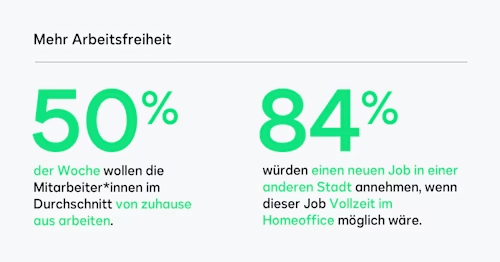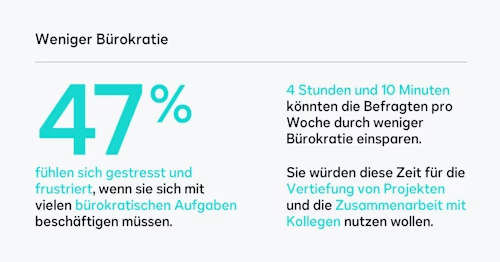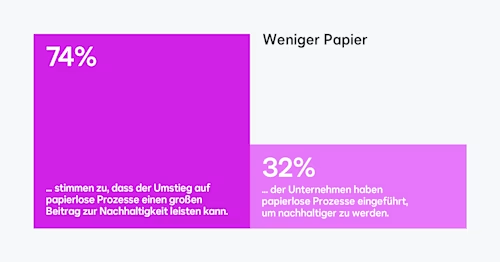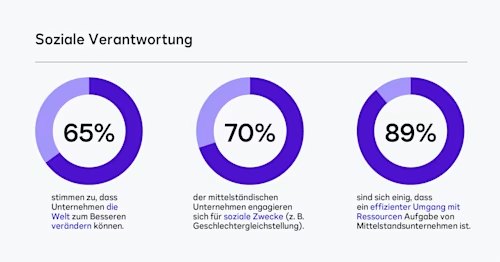
Fortschritt, dem wir zustimmen
Die neue Docusign Studie zeigt, dass der Puls des Mittelstands digital schlägt. Nachhaltigkeit, flexible Arbeitszeiten und weniger Bürokratie liegen weit vorne.
- Wir sind uns einig: Wir wollen eine neue Arbeitswelt
- Wir sind uns einig: Bürokratie im deutschen Mittelstand muss abgebaut werden
- Wir sind uns einig: Weniger Papier bedeutet mehr Nachhaltigkeit
- Wir sind uns einig: Wir haben eine große Verantwortung
- Wir sind uns einig: Wir brauchen mehr Trainings und Weiterbildungen
Inhaltsverzeichnis
- Wir sind uns einig: Wir wollen eine neue Arbeitswelt
- Wir sind uns einig: Bürokratie im deutschen Mittelstand muss abgebaut werden
- Wir sind uns einig: Weniger Papier bedeutet mehr Nachhaltigkeit
- Wir sind uns einig: Wir haben eine große Verantwortung
- Wir sind uns einig: Wir brauchen mehr Trainings und Weiterbildungen

Der Mittelstand ist das Powerhouse Deutschlands. Die Vielfalt und Fachkompetenz der mittelständischen Unternehmen, Firmen und Betriebe ist einzigartig. Deutschland hat ihnen, zu einem großen Teil, seine heutige Stellung als weltweite Wirtschaftskraft zu verdanken. Wer sind die Menschen des Mittelstands und was treibt sie um?
Wir haben uns diese Frage nicht nur selbst gestellt, wir haben sie prompt weitergegeben: in unserer großen Docusign Mittelstandsstudie im Februar 2021. Für die Studie wurden deutschlandweit 503 Personen aus mittelständischen Unternehmen über ihre Vorstellungen und Erfahrungen hinsichtlich der Corona-Pandemie und des Wandels in der Arbeitswelt befragt.
Eines können wir jetzt schon sagen: Die Antworten sind eindeutig. Digitalisierung, soziale Verantwortung, neue Arbeitswelten, Nachhaltigkeit sowie der Wunsch nach Flexibilität gehören zu den Hauptthemen, die Arbeitnehmer*innen des Mittelstands beschäftigen. Erfahren Sie mehr über die Perspektiven, Wünsche und Erwartungen der Gesichter des Mittelstands und dem Fortschritt, dem sie zustimmen.
Wir sind uns einig: Wir wollen eine neue Arbeitswelt
Seit der Corona-Pandemie, geprägt durch rigide Abstandsregeln, regelmäßige Lockdowns und Reisebeschränkungen, arbeiten viele Arbeitnehmer*innen digital. Der Mittelstand muss nun digitaler arbeiten, um in Krisenzeiten zu bestehen.
Das hat auch die Planung vieler Arbeitnehmer*innen beeinflusst: Mehr und mehr Talente zieht es von der Stadt aufs Land. 84 % der Befragten würden zu einem Arbeitgeber in einer neuen Stadt wechseln, sofern dieser 100 % Arbeiten von zuhause anbietet. Unternehmen müssen darauf reagieren und die nötige Infrastruktur schaffen, um die Arbeit aus dem Homeoffice zu ermöglichen.

Obwohl der Digitalisierungsdrang nicht neu war, wurden Homeoffice und Remote-Arbeit erst 2020 zur absoluten Notwendigkeit. Die Studie zeigt, dass viele mittelständische Unternehmen inzwischen sogar Gefallen finden an den „new ways of working“, die der digitale Fortschritt mit sich bringt. Die Befragten der Studie können sich vorstellen 2,5 Tage pro Woche an einem anderen Ort als dem Büro zu arbeiten und rund 60 % gaben an, zu Hause sogar produktiver zu sein.
Nachhaltig + digital + ortsunabhängig: In sechs Schritten zum papierlosen Büro
Wir sind uns einig: Bürokratie im deutschen Mittelstand muss abgebaut werden
Krisen sind dafür bekannt, dass sie tiefliegende Problematiken aufdecken, die jahrelang, sprichwörtlich, unter den Teppich gekehrt wurden. Diese Krise ist nicht anders. Der Begriff der digitalen Transformation geistert seit langem in der Unternehmenswelt umher, doch konnte keiner ahnen wie folgenreich das Zögern bei der Digitalisierung für die eigenen Prozesse sein würde.

Erst als alle Mitarbeiter*innen im Eiltempo in das Heimbüro geschickt wurden, wurde vielerorts sichtbar, wie viel Papier im Arbeitsalltag benötigt wird. Stundenzettel für die Arbeitszeiterfassung, Papierformulare für die Ausgabe von Werkzeugen, der papierbasierte Verkaufsauftrag aber auch Rechnungen, ausgedruckte Arbeitsverträge oder Kaufverträge und die unnötigen Rücksendeformulare im Online-Handel.
Das ist viel Papier für Prozesse, die nichts mit den eigentlichen Kernaufgaben des Unternehmens zu tun haben. Solch bürokratische Aufgaben lösen, neben den Kosten, bei 47 % der befragten Mitarbeiter*innen Stress und Frust aus. Digitalisierte und vereinfachte Prozesse sorgen also nicht nur für mehr Flexibilität, sondern auch für zufriedenere Mitarbeiter*innen. Die Befragten der Docusign Mittelstandsstudie 2021 schätzen die freigewordene Zeit durch weniger Bürokratie auf durchschnittlich vier Stunden und zehn Minuten pro Woche.
Wir sind uns einig: Weniger Papier bedeutet mehr Nachhaltigkeit
Nachhaltigkeit ist ein Megatrend, das Prinzip dahinter denkbar einfach: Ressourcen heute so nutzen, dass es morgen noch welche gibt. Passenderweise kommt der Begriff aus der Forstwirtschaft: Im Wald ist nur soviel Holz zu schlagen wie permanent nachwächst. Dieses Prinzip wurde in den Wäldern unserer Welt schon vor langer Zeit aus den Augen verloren.

Der Mittelstand ist jedoch alles andere als blind beim Thema Nachhaltigkeit. 74 % der befragten Mitarbeiter*innen glauben, dass papierlose oder papiersparende Maßnahmen, wie digitale Signaturen, digitale Notizbücher und das Reduzieren von Ausdrucken, einen Beitrag zur Nachhaltigkeit leisten. 32 % der befragten Unternehmen haben bereits darauf reagiert und setzen papierarme Prozesse in ihrem Unternehmensalltag um. Gute Nachrichten für Klima, Umwelt und natürlich unsere Bäume!
Wir sind uns einig: Wir haben eine große Verantwortung
Mitarbeiter*innen des Mittelstands setzen sich für Werte und Entscheidungen ein, hinter denen sie mit Stolz stehen können. Mehr denn je schätzen sie Unternehmen, die einen klaren, positiven Einfluss auf die Welt haben.
Nicht nur das: 65 % der Befragten glauben auch, dass Unternehmen mit ihren Produkten, Lösungen und Dienstleistungen die Zukunft aktiv mitgestalten können. Für den deutschen Mittelstand geht die Rechnung auf: 70 % der befragten mittelständischen Unternehmen engagieren sich bereits für gesellschaftliche Anliegen und übernehmen soziale Verantwortung.
Wir sind uns einig: Wir brauchen mehr Trainings und Weiterbildungen
Man lernt nie aus, das scheint der deutsche Mittelstand verinnerlicht zu haben – aufseiten der Arbeitnehmer und der Arbeitgeber. Während sich 74 % der Befragten wünschen, ihr Unternehmen würde mehr Trainings anbieten, haben 38 % der in der Studie teilnehmenden Unternehmen bereits reagiert und die Anzahl der Weiterbildungsmöglichkeiten gesteigert.
[...] Inwiefern der deutsche Mittelstand die digitale Transformation nicht nur annimmt, sondern sogar vorantreibt und sich auf ein „New Normal for Business“ geeinigt hat, hat diese Studie nochmal deutlich hervorgehoben.Daniela Becker, AVP Major Accounts Docusign

Die Corona-Pandemie hat allerdings auch das Was und Wie der Trainings verändert, die Mitarbeiter*innen sich wünschen. 40 % der befragten Mitarbeiter*innen des Mittelstands fordern aktiv Schulungen und Einführungskurse, um erfolgreich und sicher mit digitalen Lösungen arbeiten zu können.
Arbeitnehmer*innen des Mittelstands bilden eine treibende Kraft für den Fortschritt. Sie sind nicht nur offen für digitale Transformation und Nachhaltigkeit, sondern fordern diese Aspekte aktiv von ihren Arbeitgeber*innen ein. Die neue Docusign Studie zeigt, dass Unternehmen im Mittelstand reagieren oder reagieren wollen und dem Fortschritt zustimmen. Das tut der Wettbewerbsfähigkeit des gesamten Mittelstands gut.
Ähnliche Beiträge
Docusign IAM ist die Vertragsplattform, die Ihr Unternehmen braucht



